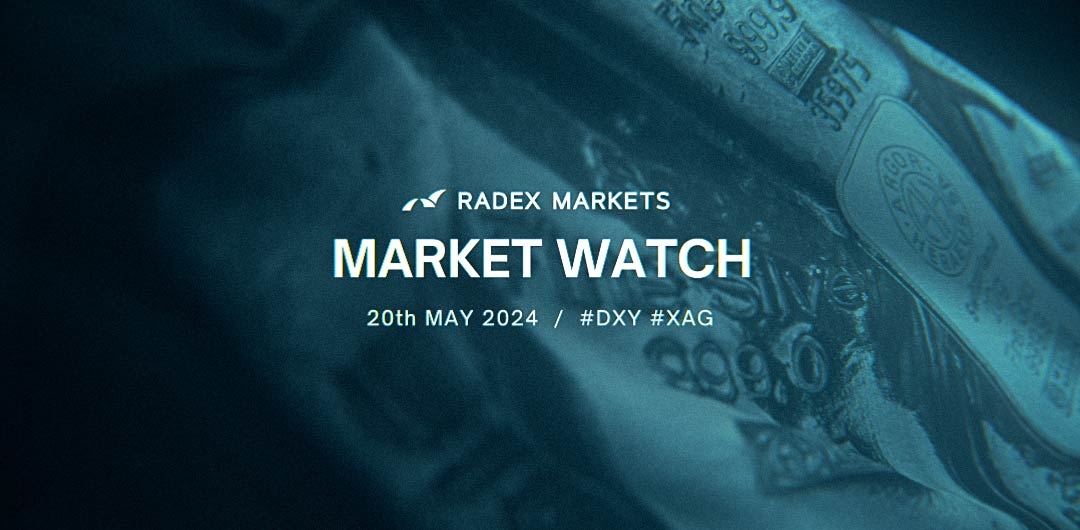
May 20, 2024
An inkling of a slowdown in the US economy was justification enough to lift stock indices to record highs last week as the Dollar finally succumbed to the prospect of lower interest rates. For once, inflation figures adhered to predictions and markets were all too keen to seize their moment. The Dow Jones Industrial Average, S&P 500 and Nasdaq Composite all set new all-time highs last week, as did the FTSE100 and a number of European stock indices.
As markets tried to gauge the likelihood and timing of a future rate cut, pressures on the Dollar sent the DXY to within touching distance of the 104 level on Thursday. The weakness in the greenback no doubt contributed significantly to the buying pressure in precious metals. Gold once again set a new record high last week, touting $2,414 as its new peak, but ultimately silver shined the brightest, climbing 6.5% straight to $31.50 an ounce by Friday’s close, a price not seen for over a decade.
Looking forward to the week ahead, traders may need to be wary of low liquidity in the markets today as Canada and most of Europe close for Pentecost. We will have to wait until Thursday to get to any substantive data releases, including manufacturing and services PMI out of Australia, Europe, the UK and the US, as well as jobless claims in the latter. Wednesday offers us a midweek treat in the form of FOMC minutes, to which currency traders will understandably devote their full attention.
Stocks surge, Dollar plummets following tame CPI data print. Inflation figures published on Wednesday finally fell in line with expectations, after consistently coming in higher than expected over the past few months. The year-on-year inflation and core inflation rates came in at 3.4% and 3.6% respectively, which sent ripples of relief among market participants who were beginning to wonder when the US economy would slow down enough to allow the Fed to finally lower interest rates. Adding fuel to the fire, retail sales came in quite a bit lower compared to consensus with the month-on-month falling to 0% and the year-on-year to 3% versus expectations of 3.8%.
The Dollar Currency Index shed 0.7% following the data release, confirming the general sentiment that interest rate cuts are back on the menu. The big three US indices all set new record highs, the DJI gaining 0.88%, the S&P 500 climbing 1.17% and the Nasdaq Composite finishing Wednesday 1.4% in the black.
On the other side of the Pacific, a mixed bag of data from the world’s second largest economy showed Chinese industrial production increase by 6.7% year-on-year, significantly beating expectations, but on the other hand retail sales fell to 2.3% versus a consensus of 3.8%. The Hang Seng Index nevertheless continued its consistent ascent, now up 20% over the past month.
The decline in the Dollar pushed gold 1.2% higher to close at $2,386 an ounce, just under a fresh record high of its own. Those keeping an eye on silver had even more to brag about, with XAGUSD gaining 3.7% to reach $29.6 an ounce.
We ended part I on a dour note. In contrast to the preceding decade, the 70s were generally characterised by poor financial performance. Markets were on hiatus, as were any real developments in the investment sphere. Then the 80s arrived, Patrick Bateman became vice president of Pierce and Pierce and the world of finance became cool again. The bull market had returned and suddenly every investor was a genius once more. The new wave of euphoria would continue up until the turn of the century. Impressive, very nice.
The 90s and early 2000s would see the introduction of many of the technological improvements we take for granted today. The Internet would conquer the financial industry much like it had taken over many others. Forex brokerages sprang up everywhere, offering people the ability to trade from the comfort of their homes. Vast server farms and lightning-fast engine matching software would draw in greater liquidity and hugely increase market efficiency. Spreads got thinner, fees plummeted, executions accelerated. The days of picking up the phone, dialling a bunch of numbers like a caveman and talking to a real-life human being were finally over.
The important process at play here is the gradual removal of barriers to entry thanks to technological progress - a paradigm shift still only in its infancy. It would not be long before people could trade stocks and crypto from the comfort of their phones. Apps like Robinhood and eToro dispensed with middlemen even more, further increasing the average investor’s exposure to financial markets. Forget trading from the comfort of one’s home, people could now trade from the comfort of the local bus stop.
For the average investor, access to financial markets changed dramatically for the better during the turn of the century. Another aspect of trading also improved during this time: transparency. With the advent of the Internet, financial information became infinitely more accessible. People on the street had access to the same information, at the same time, as multi-billion-dollar funds. Investment forums, chat rooms and online communities spread like wildfire. Information could no longer be gate kept the way it always had been. Fund manager clout was on the way out and social media was all too eager to fill the void. Instagram influencers with million follower counts could dish out stock tips to the entire world within seconds. Traders could even band together and move markets on their own. What role does the traditional financial advisor have to play in such a situation?
How could we talk about sticking it to the man without talking about the infamous GME short squeeze? For those who somehow missed it, GameStop (ticker: GME) is an American video game retailer. In early 2021, users on the subreddit /wallstreetbets discovered that Melvin Capital and a number of other investment funds were heavily short on the company. The online community smelled blood and orchestrated a short squeeze on the stock. Half the internet jumped on the bandwagon; the movement accrued religious fervour. GME shares went flying off the shelves; everyone wanted a piece of the action; even some funds joined the cause. It actually worked! The share price went from $17.25 to over $500 over the course of a month. Melvin Capital lost 53% of its investments and closed the position. The exact amount was never made public. The fund would shut down the following year. David had taken on Goliath and won.
If access to financial services increased dramatically thanks to the internet, then crypto dialled it up another notch. Crypto exchanges suffered a shaky start to say the least. Mt. Gox, the first online platform for buying and selling bitcoin was hacked in 2014 and resulted in the loss of nearly one million bitcoin. The crypto sphere is still dealing with the fallout from this event to this day. No matter, the seed had been planted. The 2010s saw an endless number of exchanges popping up. Most of them are gone now, along with their users’ deposits. Never mind, things evolve quickly in the crypto world. Fast forward a few years and we have Coinbase, an American exchange not only adhering to US financial regulations, but helping to write them. Such a scenario would have seemed impossible as little as 6-7 years ago.
This is to say nothing of the huge amount of wealth acquired by some rare crypto traders who couldn’t even tell you what a balance sheet is, let alone how to read one. A tweet from Elon Musk featuring a picture of a Japanese dog was enough to send the price of a certain cryptocurrency flying through the roof. One tiny hint of an announcement of a potential future development and green candles sprang up like daisies. The common man now had access to tremendous liquidity at the touch of a button, and the tools necessary to take advantage of it.
Self-custody, the entire point of crypto, turns out to be a much more appealing concept than first assumed. Following the trend of removing barriers to entry, it is the next logical step. Access to financial services and information is one thing, but most are still beholden to financial institutions when it comes to actually accessing their money. People want to be in charge of their own assets, without their bank impertinently asking them what they intend to do with their own cash.
The speed of financial developments in crypto has outpaced anything seen before by an order of magnitude. The shock has been such that entirely new ways of thinking about money have emerged. One may imagine waking up in the morning, generating a smart contract to compensate employees of a company on an hourly basis, or writing an insurance contract that pays out automatically based on predefined parameters, or collateralising a property to take out a loan, then spreading those funds among a selection of yield-generating pools that can be rebalanced at will depending on risk appetite. Infinite customisation, no permission necessary, no trust assumptions necessary, totally secure, at the touch of a button.
The playing field has changed. Knowledgeable crypto investors have a vast array of tools and options to manage their assets. The only real missing link lies in connecting these tools to traditional financial instruments and to real-world assets. Once that final piece of the puzzle is in place, the evolution of investor will be complete. Not long now.
US stock markets largely shrugged off reports of higher-than-expected whole sale prices to make modest gains on Tuesday. PPI figures revealed an increase of 0.5% month-on-month compared to consensus of just 0.3%, however markets seem to be more interested in the more prominent CPI figures set to be published later today. Fed Chair Jerome Powell didn’t seem too bothered by the data either, stating that PPI was more mixed than hot, then going on to say that the next move for the Federal Reserve is unlikely to be a rate hike. Powell is set to speak again on Monday and will no doubt be influenced by the imminent publication of CPI data.
The Dow Jones Industrial Average reversed Monday’s decline with a 0.32% gain yesterday, the S&P 500 climbed half a percent, whereas the Nasdaq Composite added 0.75% to reach a new record high of 16,511 points. So-called “meme stock” GameStop (GME) more than doubled yesterday before settling lower, in a move reminiscent of the infamous short squeeze back in early 2021. The stock was priced at just $10 a mere two weeks ago; it closed yesterday’s session at $48.75. Another meme stock, AMC Entertainment Holdings (AMC), was also in the spotlight, surging from $2.91 on Friday all the way up to $11.88 during intra-day trading on Tuesday.
Hard to say exactly what the resurgence of such a phenomenon entails, but it is certainly worth keeping an eye on. The last time such price action occurred happened concurrently with rapid appreciation in the crypto markets.
In the absence of any real economic data prints last week, markets latched onto the hidden hand of monetary policy as the main driver of price action. In the US, lower than expected jobs numbers contributed to optimism that the Federal Reserve might finally have the ammunition it needs to justify a lower interest rate target. On the other side of the Atlantic, several board members of the Bank of England and the European Central Bank openly stated that the prerequisites for an interest rate cut had already been achieved. The larger crowd, favouring no action for the time being, drowned out their voices, but the sentiment is slowly beginning to emerge.
Stocks on both side of the pond reacted favourably. In the US, the Dow Jones Industrial Average added 2.16% to its market cap by the end of the week, the S&P 500 climbed 1.85% over the same period and the Nasdaq Composite brought up the rear with a 1.14% gain. In the UK, the FTSE 100 clocked in a new record high after surging 2.68% on the week, now up over 1,000 points from its yearly lows. Similar story for the German DAX, which gained over 4% to reach fresh highs of its own.
Absolutely nothing on the economic calendar today, but on Tuesday Fed Chair Jerome Powell will deliver a speech at an event in the Netherlands. Wednesday delivers a slew of US inflation data followed by jobless claims the following day. Finally, on Friday we have a few important data prints out of China before tuning in to comments from the ECB.
The Bank of England elected to maintain interest rates at the current 5.25% yesterday, to the surprise of no one. What wasn’t so expected was the fact that two of the nine Monetary Policy Committee members voted in favour of a rate cut. The result suggests there is a stronger appetite for monetary easing than previously assumed. The recent progress made on inflation in the UK also lends itself to a shift in policy sooner rather than later.
Such optimism no doubt contributed to the FTSE 100 finally reaching a new all-time high this week. The index had been lagging behind the major European and American indices up until recently but seems to have found its footing, brushing up against 8,400 points during yesterday’s session. The German DAX has also had a solid week so far, establishing new record highs of its own, similarly buoyed by the prospect of lower rates in the Euro.
Speaking of American indices, the latest jobs data continued to have a positive impact on the Dow Jones Industrial Average, which gained 0.85% yesterday. The S&P 500 and Nasdaq Composite weren’t far behind, climbing 0.51% and 0.27% respectively. As a very light news week draws to an end, traders will already have their eyes on next week’s more substantive offerings to orient themselves.
Minor weaknesses in the Dollar helped push gold higher on Thursday, up 1.6% to $2,345 an ounce by yesterday’s close. Silver put in a sterling performance, gaining 3.6% over the same time frame, blasting past $28 an ounce.
Эрсдлийн дохио : Худалдааны дериватив ба хөшүүрэг бүтээгдэхүүн нь өндөр түвшний эрсдэлтэй байдаг.
ДАНС НЭЭХ